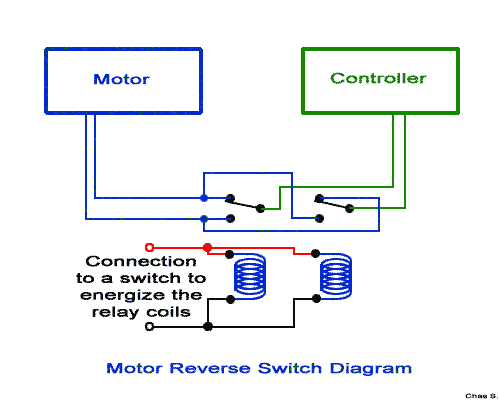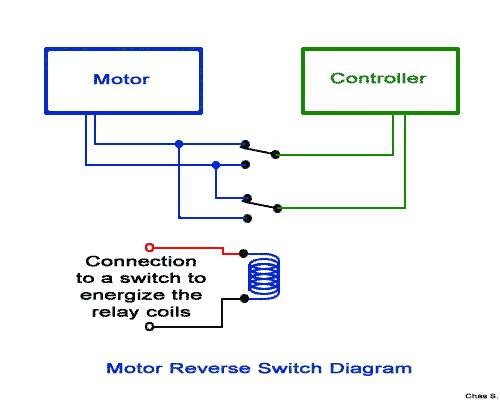Hi guys,
I've stripped a 24v,250w jambuster scooter to use the bits to make an electric kart for the kids! So far so good, now I want to get clever!!! I've used a DPDT Cross-over switch rated at 10A to create a reversing switch, changing over the polarity of the motor; this is tested and works fine. However, does anyone know what the potential problems are of operating this whilst scenario a) the throttle is off but the kart is still rolling or worse still, b) the throttle is still applied and the switch is flicked to reverse the motor polarity?
Under test on the bench with no load, the motor stops violently quickly then reverses direction. Could this knacker the speed controller or the motor if this happened under load? If it is a problem, is there a simple solution or is a mechanical interlock advised? Just for info, the controller does not have regenerative braking as far as i can see, its just a generic chinese jobby!!!
Thanks guys,
Chizz



I'm concerned that the rating on the switch you're using is not high enough. I like to have the rating on switches to be well above the load they'll see to have a safety margin. The switch contacts can weld closed.
Since I don't speak the brand of English that you apparently speak, I can only guess what you mean by 'knacker' and ... I don't think the controller will get messed up. But it could cause some mechanical problem such as the chain breaking.
- David Herron, The Long Tail Pipe, davidherron.com, 7gen.com, What is Reiki
You can get a 24V 30 amp controller with reverse for $30. Then you don't have to worry about anything.
Look for YK48-2 on this page, http://tncscooters.com/partsdb.php?type=ES
Philip
Philip
2011 Nissan Leaf SL
Thanks guys, Philip, had a look at your suggestion. Unfortunately I'm in the UK and these parts seem a lot more expensive here. 4Qd seem to be the main suppliers and their reversing controllers are in excess of £60 ($90 plus)!!! So not an affordable option for me. But thanks for the suggestion, much appreciated.
One thing you could try is to place the switch in a location where you must let go of the throttle to switch the switch. Even is the cart is coasting as long as power is not applied when the switch is changed it should not cause a problem.
Grandpa Chas S.
Hi again,
I took on board your comments re overloading a 10Amp DPDT Changeover switch. Although it worked fine not under load, I see that it could weld up when loaded. So, unable to find a DPDT Changeover relay of the correct rating, I bought 2 SPDT relays, rated at 12v coil and 30A contacts. I've wired it up so that the coils are supplied from the terminals of 1 of the 12v batteries, this seems to work fine, they click over simultaneously. Then I've wired as follows:
Common terminal 30 on both relays - Fly leads to motor
Terminal 87a (relay 1)cross over to terminal 87 (relay 2)
Terminal 87 (relay 1) cross over to terminal 87a (relay 2)
Fly leads off terminals 87 and 87a to motor output from speed controller
I then connected the motor as above, relay coils to 12v and then plugged the spd controller output into the circuit at which point I got a huge spark and now the speed controller is completely dead!!!!
Any ideas where I went wrong guys?
Thanks
chizzer,
I am sorry I do not understand your wiring instructions. Could you make a drawing or diagram? That may help me understand what you did and I might be able to help.
Grandpa Chas S.
chizz :? Let me ask questions Were on the controller did you conect the coils to ? swiching on the controller is no more than +5Volts that might be were the magic smoke broke the controller maybe if you would have put a simple switch for the 12V coil ? LaTeR ;)
thank GOD I wake up above ground !!!!
Maybe this will help.

Grandpa Chas S.
Thanks Grandpa Chas!!
I'm afraid I don't have any software etc to do drawing, but essentially my circuit was exactly the same as you have drawn, except that I had the motor and the controller the opposite way round,ie. the motor connected to the relay common terminals, whereas in your drawing you have the speed controller connected to the common terminals. Is that where I went wrong? I've tested the circuit again with a voltmeter connected where the motor should be and the 24v batteries connected directly instead of the speed controller. It seems to work fine, I get alternating polarity 24v reading on my meter. I think one error I certainly made was no fuses in the circuit, maybe a 20A fuse in the battery + might have saved the controller?
Anyway, got a new controller now, but will be giving reverse circuit a miss until I figure out, hopefully with your help, where it could have gone wrong!
Thanks
Kev
Chizzer,
It does not matter which side of the diagram is the controller or motor, it will work either way. When I use this diagram I do make one important thing different, I use one (1) relay with 2 sets of contacts. The reason to use only one relay is simple. If two (2) relays are used and only one relay activates when the switch is on it will cause a short circuit and the controller output wires will be connected together. this will release the magic smoke and the controller will be dead. Maybe this is what happened. Just speculation, wild guess, but I would use one (1) relay to ensure this does not happen. Here is a new diagram;

Grandpa Chas S.
Make SURE it is a "break-before-make" relay, or you will fry another controller.
Also, switching direction with power applied to the motor is a BAD idea, since the violent stop-and-reverse could easily injure your kid.
For safety, it is FAR better to interlock the rev/fwd change so that it can ONLY be done with the "throttle" OFF.
Cheers, Gary
XM-5000Li, wired for cell voltage measuring and logging.
Personally I dont think the reverse switch would have been a problem because it would have not had such a sharp breaking effect with the momentum of the kart, but I share the concerns of the rating of the switch as it could pull upto 25amps.
Alternatively I thought about using a relay. I dont know much about relays, but I know they take a power source. If I have a 24v bat and 24v motor, can I take the supply for the relay off my 24batt, or is it better to have another circuit powered by a 9v small battery or something? If someone could explain relay powering and termials to me I would be v grateful.
Hi, Thanks for all your suggestions. You might be interested to have a look at the kart now it's ready for testing
http://visforvoltage.org/forum/5874-electric-kart-child
Still haven't sorted out reverse though. Think best way is via a relay with DPDT and 30A rated contacts, however still haven't located a supplier with one in the UK!
Think I'll connect this via a microswitch operating off the throttle pedal. When the pedal is released it makes the circuit powering the coil of the relay via a simple switch so when the switch is operated it changes the relays state and reverses polarity. One question, does a latching relay exist that would mean that the relay would remain in the switched state even if the power to the coil in it was removed? I'm thinking that she's gonna have to depress the throttle to go in reverse so the microswitch would operate cutting the power to the relay. If it was a standard DPDT relay, when the microswitch operated the relay would return to it's unpowered state ie forward motion.
Kev
This may help. Jim
DPDT 24v 30a
http://www.grainger.com/Grainger/items/3X749
Check this out. Jim
High Power 40 - 50 Amp Relay Single Pole, Double Throw
is is a rugged, high power automotive relay. It is single pole, double throw with a 12 volt coil. The normally open contact is rated at 50 amps and the normally closed contact is rated at 40 amps. With 1/4" quick connect teminals, it fits in a standard relay socket or it can be secured with the built-in mounting tab. The approximate
size is 1" H x 1" W x 1" D.
http://motors.shop.ebay.com/eBay-Motors__W0QQ_nkwZ50Q20ampQ20relayQQ_sacatZ6000QQ_trksidZp4522Q2em38Q2el1313?_rdc=1
Here is his Ebay store.
http://stores.shop.ebay.com/GAMA-Electronics-Inc__W0QQ_armrsZ1
Chizzer,
Cool project! I saw the pics on the other post. I am working on a similar project with a full sized 48v scooter converted to a kart.
I am wondering if you ever got the reverse totally worked out. I have a hub motor on this thing with no identification. I have no idea how to identify it. I was thinking about throwing in a dpdt switch, but didn't want to fry anything.
Have you had any problems with this thing trying to kick in reverse while it's moving forward, or vise versa?
Thanks,
Alan
He Chizzer, create a mechanical coupling device, like say car's manual transmition, (friction plate and decoupling device) if you don't want complicated electronic inertia management system (they are nightmare, I am designing one right now, cost a fortune complicated and reliability is sh...t so far, I hardly ever sleep not thinking about the system lol) and will definitely take fun out of just zooming around on electric kart.
Alex